Edward Feser's Blog, page 61
November 7, 2017
Dawkins vs. Aquinas on Pints with Aquinas
 Recently I was interviewed by Matt Fradd for his
Pints with Aquinas
podcast. We talk a bit about
Five Proofs of the Existence of God
, but our main topic is Richard Dawkins’s critique of Aquinas’s Five Ways in The God Delusion. We work through each of the objections Dawkins raises and discuss where they go wrong. Matt is posting the interview in two parts, and the first part has now been posted.
Recently I was interviewed by Matt Fradd for his
Pints with Aquinas
podcast. We talk a bit about
Five Proofs of the Existence of God
, but our main topic is Richard Dawkins’s critique of Aquinas’s Five Ways in The God Delusion. We work through each of the objections Dawkins raises and discuss where they go wrong. Matt is posting the interview in two parts, and the first part has now been posted.Several other recent interviews about Five Proofsare linked to here.
Published on November 07, 2017 19:33
November 6, 2017
Aristotle and contemporary science
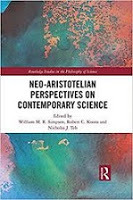 Routledge has just released the important new anthology Neo-Aristotelian Perspectives on Contemporary Science, edited by William M. R. Simpson, Robert C. Koons, and Nicholas J. Teh. I’ve contributed an essay titled “Actuality, Potentiality, and Relativity’s Block Universe.” The other contributors are Xavi Lanao, Nicholas Teh, Robert Koons, Alexander Pruss, William Simpson, Tuomas Tahko, Christopher Austin, Anna Marmodoro, David Oderberg, Janice Chik, William Jaworski, and Daniel De Haan, with a foreword by John Haldane. The book is available in hardcoveror, for a much lower price, in an electronic version.More information is available at Routledge’s website.
Routledge has just released the important new anthology Neo-Aristotelian Perspectives on Contemporary Science, edited by William M. R. Simpson, Robert C. Koons, and Nicholas J. Teh. I’ve contributed an essay titled “Actuality, Potentiality, and Relativity’s Block Universe.” The other contributors are Xavi Lanao, Nicholas Teh, Robert Koons, Alexander Pruss, William Simpson, Tuomas Tahko, Christopher Austin, Anna Marmodoro, David Oderberg, Janice Chik, William Jaworski, and Daniel De Haan, with a foreword by John Haldane. The book is available in hardcoveror, for a much lower price, in an electronic version.More information is available at Routledge’s website.
Published on November 06, 2017 18:03
Pakaluk on capital punishment
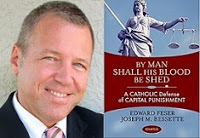 Philosopher Michael Pakaluk kindly provided an endorsement for By Man Shall His Blood Be Shed: A Catholic Defense of Capital Punishment. In an essay at The Catholic Thing, Mike puts forward an important defense of his own of the death penalty. Go give it a read. Along the way, he comments once again on By Man, calling it “the most comprehensive case ever assembled” for capital punishment.Other recent commentary on By Man can be found here.
Philosopher Michael Pakaluk kindly provided an endorsement for By Man Shall His Blood Be Shed: A Catholic Defense of Capital Punishment. In an essay at The Catholic Thing, Mike puts forward an important defense of his own of the death penalty. Go give it a read. Along the way, he comments once again on By Man, calling it “the most comprehensive case ever assembled” for capital punishment.Other recent commentary on By Man can be found here.
Published on November 06, 2017 17:39
November 2, 2017
Review of Dennett’s From Bacteria to Bach and Back (Updated)
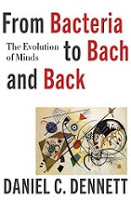 UPDATE 11/19: The review can now be read online for free.
UPDATE 11/19: The review can now be read online for free.My review of Daniel Dennett’s From Bacteria to Bach and Back: The Evolution of Minds appears in the Fall 2017 issue of the Claremont Review of Books. (This is the issue that also contains Janet Smith’s review of By Man Shall His Blood Be Shed. Good excuse to buy a copy!)
Published on November 02, 2017 14:53
Review of Dennett’s From Bacteria to Bach and Back
 My review of Daniel Dennett’s
From Bacteria to Bach and Back: The Evolution of Minds
appears in the Fall 2017 issue of the Claremont Review of Books. (This is the issue that also contains Janet Smith’s review of By Man Shall His Blood Be Shed. Good excuse to buy a copy!)
My review of Daniel Dennett’s
From Bacteria to Bach and Back: The Evolution of Minds
appears in the Fall 2017 issue of the Claremont Review of Books. (This is the issue that also contains Janet Smith’s review of By Man Shall His Blood Be Shed. Good excuse to buy a copy!)
Published on November 02, 2017 14:53
Review of Dennett’s From Bacteria to Back and Back
 My review of Daniel Dennett’s
From Bacteria to Bach and Back: The Evolution of Minds
appears in the Fall 2017 issue of the Claremont Review of Books. (This is the issue that also contains Janet Smith’s review of By Man Shall His Blood Be Shed. Good excuse to buy a copy!)
My review of Daniel Dennett’s
From Bacteria to Bach and Back: The Evolution of Minds
appears in the Fall 2017 issue of the Claremont Review of Books. (This is the issue that also contains Janet Smith’s review of By Man Shall His Blood Be Shed. Good excuse to buy a copy!)
Published on November 02, 2017 14:53
Smith on By Man Shall His Blood Be Shed
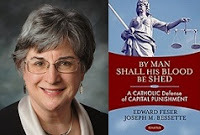 In the Fall 2017 issue of the Claremont Review of Books, Catholic moral theologian Janet Smith reviews
By Man Shall His Blood Be Shed: A Catholic Defense of Capital Punishment
. Writes Smith:
In the Fall 2017 issue of the Claremont Review of Books, Catholic moral theologian Janet Smith reviews
By Man Shall His Blood Be Shed: A Catholic Defense of Capital Punishment
. Writes Smith: [T]he central argument of [the book is] that some crimes deserve death, and that this is now and has always been the teaching of the Catholic Church. Anyone who would claim otherwise must contend with Edward Feser and Joseph Bessette’s unparalleled – and I’m tempted to say, irrefutable – marshalling of evidence and logic in this important new book.More from the review:
Because we are no longer accustomed to rigorous arguments or a relentless appeal to logic, the prose is jarring. Rather than tentative terms like “it seems to me” or “I would like to suggest,” the authors prefer testosterone-fueled diction; regularly using terms such as “absurd,” “preposterous,” “simplistic,” and “reckless” when evaluating their opponents’ arguments. As much as such language has value for its wallop, novelty (in a scholarly work) and, yes, accuracy, the arguments are so strong, I timidly suggest, that perhaps the authors should have allowed readers to “draw their own conclusions” more often. But let me say, the book simply flattens its opponents. (Testosterone-charged prose is contagious!)
In the book’s first half Feser systematically refutes the arguments of those who think the Church now teaches that capital punishment is intrinsically unjust. He helps readers to see how weak our attachment to justice has become and how little we allow tight reasoning about justice to govern our thinking…
Feser painstakingly refutes the arguments of “new natural law” theorist E. Christian Brugger, an ardent opponent of capital punishment, effectively identifying some of the weaknesses of new natural law theory itself…
Feser thoroughly and carefully examines Scriptural approval of the death penalty… He notes that no one has successfully refuted the claim that the Bible unequivocally supports the right of states to execute some wrongdoers…
Feser successfully argues that [the Catechism’s] “development” must be viewed as a prudential judgment by Pope John Paul rather than an authoritative teaching, and thus Catholics are free to contest it…
Bessette then turns his attention to the statements about capital punishment put out by the United States Conference of Catholic Bishops, which are seriously flawed… He reviews extensive studies on the death penalty’s deterrent power, the number of persons unjustly condemned to death row, on the charge that racism causes the death penalty to be applied unfairly, as well as on the claim that it is applied unfairly to the poor. He uses this data to refute claims made by the bishops that capital punishment has no deterrent power, that innocent persons are regularly executed, that the application of the death penalty has been unfairly applied to minorities and the poor.
End quote. Smith does raise a criticism of the book as well. While she does not deny that the death penalty is appropriate in some cases, Smith argues that we pay insufficient attention to certain cases where circumstances plausibly reduce the culpability of the offender to the point that it would be better to refrain from inflicting capital punishment. She suggests that the case of Karla Faye Tucker, whose childhood and teenage years were very troubled and who seems to have been genuinely repentant, is a plausible example.
This is a discussion worth having. I would say that the aim Joe and I had in writing the book was not so much to set out detailed, specific criteria for exactly when capital punishment is appropriate, but rather to show that it is appropriate in far more cases than many contemporary Catholics would like to admit. The pendulum has swung way too far in the abolitionist direction, and our aim is to restore balance and sobriety to the discussion. When Catholics once again pay serious attention to the entireCatholic philosophical and theological tradition of thinking about this subject, and to the actual social scientific evidence, the serious issues Smith raises can be fruitfully addressed.
Published on November 02, 2017 14:51
October 31, 2017
Five Proofs around the net
 Strange Notions has kindly hosted a Q and A on my book Five Proofs of the Existence of God(which you can order either from Amazon – though they are temporarily out of stock – or directly from Ignatius Press). They chose ten of the questions submitted and have now posted my responses. Among the topics that arise are the nature of proof, polytheism, divine simplicity, and the relationship between Thomism and idealism.
Strange Notions has kindly hosted a Q and A on my book Five Proofs of the Existence of God(which you can order either from Amazon – though they are temporarily out of stock – or directly from Ignatius Press). They chose ten of the questions submitted and have now posted my responses. Among the topics that arise are the nature of proof, polytheism, divine simplicity, and the relationship between Thomism and idealism. Part II of the two-part interview on the book I recently did for The Patrick Coffin Show has now been posted (and can be viewed either at Patrick’s website or at YouTube). This part is a Q and A session with the audience. Among the topics that arise are Thomas Nagel, process theology, the problem of evil, and invincible ignorance.At The Secular Outpost, atheist Bradley Bowen continues his critical look at Five Proofs, this time focusing on the Aristotelian proof.
Published on October 31, 2017 17:50
October 30, 2017
A further reply to Fastiggi, etc.
 In an article at Catholic World Report, Robert Fastiggi is critical of the position I have taken vis-à-vis Pope Francis and capital punishment in my recent articles at
Catholic Herald
and
Catholic World Report
. I reply to Fastiggi in a new CWR article.
In an article at Catholic World Report, Robert Fastiggi is critical of the position I have taken vis-à-vis Pope Francis and capital punishment in my recent articles at
Catholic Herald
and
Catholic World Report
. I reply to Fastiggi in a new CWR article. At Public Discourse, E. Christian Brugger has published a two-part article (here and here) responding critically to By Man Shall His Blood Be Shed . I have written a detailed reply to Brugger which will appear at Public Discourse soon. I also recently replied to David McClamrock’s review here at the blog.
Meanwhile, other responses to Fastiggi and/or Brugger have been given by Edward Peters at Catholic World Report , John Joy at One Peter Five , and Chris Plance and Timothy Gordon at Church Militant . At First Things , Dan Hitchens cites the death penalty controversy as an illustration of the doctrinal crisis now facing the Church. Further commentary from Fr. George Rutler.
Published on October 30, 2017 15:45
October 29, 2017
McClamrock on By Man shall His Blood Be Shed
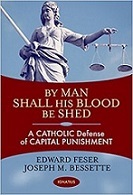 At
Today’s Catholic
, David McClamrock reviews
By Man Shall His Blood Be Shed: A Catholic Defense of Capital Punishment
. It’s a somewhat mixed review. On the one hand, McClamrock acknowledges that:
At
Today’s Catholic
, David McClamrock reviews
By Man Shall His Blood Be Shed: A Catholic Defense of Capital Punishment
. It’s a somewhat mixed review. On the one hand, McClamrock acknowledges that: The authors do make, and effectively support, many points worthy of serious consideration. Among them, are in brief: Catholics are not required to favor the abolition of the death penalty. The church has consistently taught that capital punishment is legitimate in principle, while often pleading for mercy in practice. Death is a deserved and proportionate punishment for the worst murderers. The credible prospect of the death penalty prevents crimes and saves lives... Numerous arguments for abolition of the death penalty are weak, ill-founded or even downright stupid…
By exploding the view that extreme anti-death-penalty absolutism is the only authentically Catholic position, the work of Feser and Bessette may be helpful in recovering a well-balanced view of capital punishment.End quote. So far so good, and frankly I’m pretty much satisfied by even a critical review that acknowledges that much. Mission accomplished.
Still, McClamrock is not entirely happy with the book. He also writes:
If only the authors had stopped after making points like these. Alas, they didn’t. Not satisfied with saying that death may be a suitable punishment for the worst crimes, they assert that no punishment less than death would be severe enough as retribution for such crimes. The authors provide no support for this claim, however. Worse yet, despite many references to the teaching of St. Thomas Aquinas, they ignore the parts of St. Thomas’s teaching that contradict their claim.
End quote. Before continuing, it should be noted that this is a puzzling accusation. McClamrock has already acknowledged that we make a serious case for the claim that “death is a deserved and proportionatepunishment for the worst murderers.” But to show that death is a proportionatepunishment for the worst murders just isto show that it is of the right degree of severity. And into the bargain, we quote a passage from Aquinas in which he insists that proportionality involves an appropriate degree of severity. So what’s the problem?
The problem, in McClamrock’s view, is that we don’t pay sufficient attention to what Aquinas says about mercy, and that we claim that death is the minimum sufficient penalty for some crimes when in fact all Aquinas thinks (according to McClamrock) is that it is the maximum appropriate penalty.
However, while it is true that we don’t quote the specific passage McClamrock cites, nothing we say is incompatible with it. McClamrock himself acknowledges later in the review that we do not claim that someone deserving of death mustbe executed. He acknowledges that we claim only that there is a presumption in favor of execution, that this presumption can be overridden, and that it can be overridden for moral reasons, specifically, including a concern for mercy. So, again, what’s the problem?
Nor does Aquinas actually say, in the passage cited by McClamrock, anything about whether proportionality has to do with a minimum or instead merely a maximum degree of severity. What he does say is that “God acts mercifully, not indeed by going against His justice, but by doing something more than justice” (emphasis added). That does not entail (contrary to what McClamrock appears to think) that justice does not in fact require death as the minimum deserved punishment for certain sufficiently grave crimes. (After all, when St. Paul says that the wages of sin is death, he doesn’t mean merely that death will be the maximum punishment we can get for sinning.)
What is meant, I would argue, is rather this. Securing retributive justice is subordinate to yet higher ends such as maintaining the good order of a community and securing the salvation of souls. Now, often, making sure that retributive justice is done (including the infliction of the death penalty) is exactly the best way to realize those ends. But there can also be cases where robotically securing retributive justice would not be the best way to realize them, so that mercy is called for.
(There is an analogy here with the body. There is a presumption against amputating any part of the body, because in the normal case to do so would work against the good for the sake of which the body parts exist. However, if a body part is diseased this presumption is overridden, and refraining from amputating it would undermine rather than further the good for the sake of which the part exists. Similarly, in general we should not give people less than what they deserve, but there may nevertheless be cases where we ought instead to show mercy, precisely because doing so would be a better way to realize the end for which the practice of giving people what they deserve exists.)
So, in showing mercy, God does not “go against” justice, because justice itself serves a higher end, and mercy is shown when it would be the best way to secure that higher end. Mercy, in other words, is in that case the best way to realize what justice itself is aiming at. God is doing “something more” than justice precisely insofar as he is acting in light of the end for which justice itself exists, rather than focusing merely on what justice considered all by itself would call for.
So, the question of minimum versus maximum degrees of severity simply isn’t what is at issue, and therefore there is no conflict between what Joe Bessette and I say and what Aquinas says.
So, so far, I’m not sure that McClamrock really disagrees with Joe and me substantively. When matters of terminology and exegesis are clarified, we might be saying more or less the same thing. However, McClamrock also says one further, and puzzling, thing when he comments on Genesis 9:6 (“Whoever sheds the blood of man, by man shall his blood be shed; for God made man in his own image”).
McClamrock says that the reference to human dignity in this passage still applies today, but not the reference to capital punishment. Why not?
Well, first, he says that in the Old Law, we need to distinguish between moral, judicial, and ceremonial precepts, and that only the moral precepts are still in force. So far so good. But so what? The sanction in Genesis 9:6 precedes the Old Law.
But second, McClamrock acknowledges precisely this. Genesis 9:6, he writes, is part of “God’s command to Noah… [which] existed before the Old Law.” So, so far still so good. But then, what’s the problem? What does the Old Law, which came later, have to do with anything?
Well, according to McClamrock, just this. The command of Genesis 9:6:
was later included in the Law…, and is identical in substance to the corresponding precept of the Old Law in Exodus 21:12, “Whoever strikes a man so that he dies shall be put to death.” As the judicial precept of Exodus 21:12 is no longer in force, neither is that of Genesis 9:6, even though it was first instituted before the Law.
End quote. Now, I have to admit that I find this argument simply baffling. How does the fact that the command to Noah was incorporated into the Old Law entail that it is no longer in force once that latter law is no longer in force?
Compare: The precepts that murder is wrong, and that we are obliged to honor our parents, were part of natural law before the Old Law came around. Later they were incorporated into the Old Law. Does that mean that they are no longer in force now, no longer part of the natural law, since the Old Law is no longer in force? Of course not. The natural law remains in force regardless of whether or not its elements come to be temporarily incorporated into either divine law (e.g. the Old Law) or human law. But by the same token, the fact that the command to Noah was incorporated into the Old Law simply does not entail that it is no longer in force after the Old Law is abrogated. It tooremains in force (for all McClamrock has shown) apart from whether or not it is temporarily incorporated into divine law (e.g. the Old Law) or human law.
(Note for those readers who may be wondering: Yes, responses to the latest from Brugger and Fastiggi are forthcoming soon. Stay tuned.)
Published on October 29, 2017 15:43
Edward Feser's Blog
- Edward Feser's profile
- 331 followers
Edward Feser isn't a Goodreads Author
(yet),
but they
do have a blog,
so here are some recent posts imported from
their feed.



